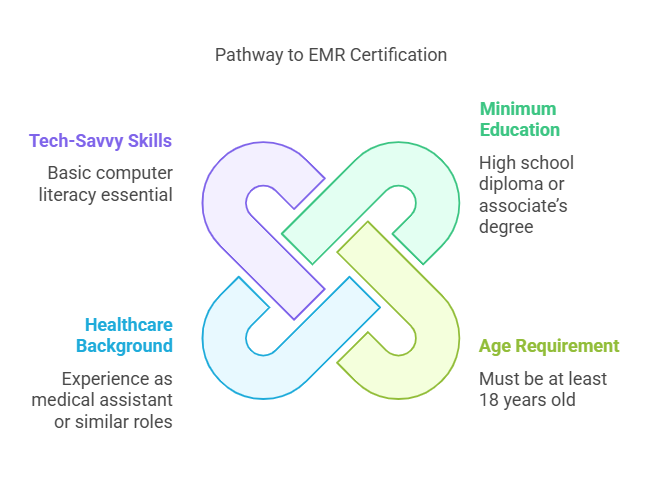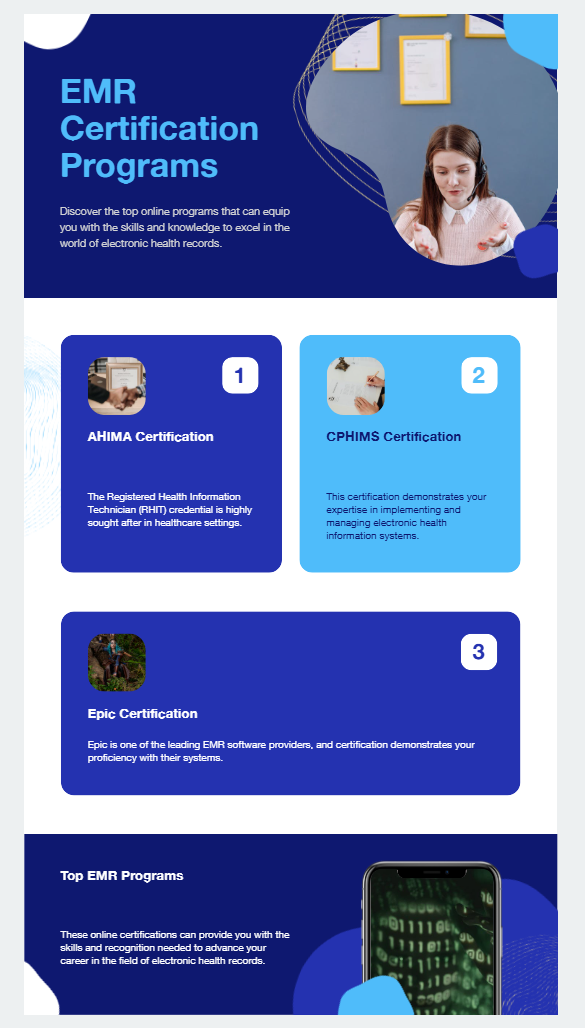Electronic Medical Record Certification
Remember the days when doctors scribbled notes on paper charts that looked like a secret code only they could understand? Well, those days are gone. Welcome to the era of Electronic Medical Records (EMR) – where every patient’s medical history, test results, and treatment plans are just a click away. But here’s the catch: managing these digital records requires specialized skills, and that’s where Electronic Medical Record Certification comes in.
If you’re looking to future-proof your healthcare career, this guide will walk you through everything you need to know about Electronic Medical Record Certification in 2025. We’ll cover why it’s essential, how to get certified, top programs, career benefits, real-world applications, and even FAQs that no one else talks about. Ready? Let’s dive in!

Why Electronic Medical Record Certification Matters in 2025
Over the last decade, there has been a massive digital transformation in the healthcare industry. With governments making a provision for electronic records and hospitals trying to implement AI powered healthcare systems,the need for certified electronic health records (EHR) professionals is on the rise.
Key Benefits of EMR Certification:
Higher Salary Potential – EMR-certified professionals earn up to 30% more than non-certified counterparts.
Increased Job Opportunities – Over 15,000 new job openings in medical records management are expected each year.
Mastery Over EHR Software – Work with top EHR systems like Epic, Cerner, Meditech, NextGen, and Allscripts.
Better Patient Care – Proper record-keeping reduces medical errors by up to 85%.
Legal Compliance & Data Security – Learn HIPAA compliance and protect sensitive patient information.
If you want to thrive in the modern healthcare industry, EMR certification isn’t just an option – it’s a necessity.

Eligibility Criteria for EMR Certification
So, who can get certified? The requirements are surprisingly flexible, making it accessible for a broad audience:
Minimum Education: High school diploma (though an associate’s degree in healthcare helps!).
Age Requirement: Must be at least 18 years old.
Background in Healthcare (Preferred): Prior experience as a medical assistant, billing specialist, or admin is a plus.
Tech-Savvy Skills: Basic computer literacy is essential.
While prior healthcare experience isn’t always required, some programs recommend basic knowledge of medical terminology and healthcare workflows.

Best Online EMR Certification Programs in 2025
1. MedCerts – Certified Electronic Health Records Specialist (CEHRS)
Comprehensive online training
Covers medical terminology, patient data management, and healthcare documentation integrity
Prepares for the CEHRS exam by the National Healthcareer Association (NHA)
2. USCI – Electronic Medical Records Specialist Program
Ideal for beginners looking to break into medical records management
Includes hands-on experience in practice management systems
3. Genesis Medical College – EHR Training Program
Focuses on the legal and compliance aspects of EHR management
Prepares students to work in hospitals, clinics, and insurance companies
4. Kennesaw State University – Certified EHR Specialist + Medical Terminology
Includes both EHR training and medical terminology education
NHA-certified and industry-recognized
These programs provide a perfect blend of theory and real-world application, ensuring that you graduate job-ready.

Core Components of EMR Training
EMR certification programs are not only about the software, they turn you into a healthcare data expert. Here’s what you’ll learn:
1. Medical Terminology
It is very important to understand clinical language for correct data entry and record management. A single typo can cause fatal medical mistakes!
2. Patient Data Management
You’ll learn how to securely record, retrieve, and update patient records using top EHR software.
3. Healthcare Documentation Integrity
Accuracy of data and security are the core of EMR certification. You will learn HIPAA compliance, data privacy and cybersecurity protocols.
4. Hands-On EHR Software Training
Expect practical training with platforms like Epic, Meditech, and Cerner.
5. Coding and Billing Basics
A crash course in medical coding (CPT, ICD-10, HCPCS) and billing is usually included.

The Future of EMR Jobs: Career Outlook & Salary in 2025
Job Growth: The demand for EMR-certified professionals is expected to grow 9% by 2033.
Average Salary: $48,780 per year (or $23.45/hour) – higher for those with CEHRS certification.
Industries Hiring:
Hospitals & Clinics
Insurance Companies
Medical Billing & Coding Firms
Government Health Agencies

FAQs: The Questions Nobody Else Answers
-
Absolutely! With AI-driven healthcare expanding, certified professionals are in high demand.
-
Yes! 100% online programs allow you to learn at your own pace!
-
The CEHRS by NHA is the most recognized and highly valued by employers.
-
Not necessarily, but it helps! Some programs offer beginner-friendly options.
-
Most programs take 8-12 weeks to complete.
-
Costs range from $500 to $2,000, depending on the program and institution.
-
Yes! Hospitals and large healthcare organizations prefer certified professionals.
-
Practice with mock exams, study guides, and hands-on EHR training.
10 Surprising Facts About EMR Certification
EMR specialists can work remotely – perfect for work-from-home seekers!
While specific data on EMR specialists is not provided, remote work in healthcare is becoming more common. For example, about 6% of healthcare jobs are hybrid and another 5% are fully remote, including some clinical and nonclinical roles.
Live Link: https://www.mgma.com/mgma-stat/remote-and-hybrid-work-are-here-to-stay
AI is being integrated into EHR systems – future-proof your career.
AI is increasingly being used in EHR systems to improve efficiency, accuracy, and patient care. AI-powered EHR systems enhance data integration, provide real-time alerts, and offer personalized patient care.
Live Link: https://insights.omnia-health.com/technology/what-does-future-hold-ai-supplemented-ehr-solutions
Medical errors cost the U.S. $20 billion annually – EMR specialists help prevent this.
Medical errors are indeed costly, with estimates suggesting they cost the U.S. approximately $20 billion annually. EHR systems help reduce these costs by preventing medication errors and improving patient safety.
Live Link: http://graduate.northeastern.edu/knowledge-hub/benefits-of-ehr-systems/
EHR data breaches are a real threat – certification teaches cybersecurity.
While specific references to EHR data breaches are not provided, EHR systems do offer enhanced data security compared to paper-based systems, including secure storage and access controls. However, cybersecurity remains a concern in healthcare.
Live Link: http://graduate.northeastern.edu/knowledge-hub/benefits-of-ehr-systems/
EMR jobs exist in law firms, too – think medical malpractice cases.
Telehealth relies on EHR expertise – demand is booming.
Telehealth has expanded significantly, and EHR expertise is essential for its operation. Telehealth relies on seamless access to patient records, which EHR systems provide.
Live Link: https://www.linkedin.com/pulse/breaking-down-job-market-remote-healthcare-professionals-kzivf
Insurance companies hire EMR-certified pros – fraud prevention is key.
EMR roles can lead to healthcare IT careers – high-paying opportunities!
Big Tech (Google, Amazon) is entering healthcare – get in early.
The CEHRS pass rate is 70% – but proper prep gives you an edge.
Ready to Get Certified? Here’s Your Next Step
Looking for the best medical coding and billing certificates? Check out AMBCI – a trusted provider of industry-leading certification programs designed to set you up for long-term success.
With the right EMR certification, you’re not only securing a job, you’re creating a future proof career in the most rapidly expanding segment of the healthcare industry!
